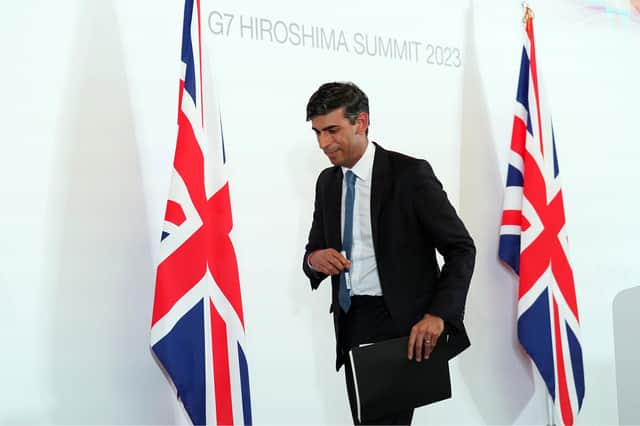Brian Monteith: The makings of Crony Corporatism will be the death of Sunak’s Conservatives


The question is no longer if they will lose to Keir Starmer’s weathervane Labour Party but by how many seats.
Barring an unexpected meteor-like event which hollows-out Labour’s consistent double digit polling lead, it is Labour’s election to lose as Rishi Sunak shows no evidence of wishing to take steps that will bring lost voters back to the Conservatives.
Advertisement
Hide AdAdvertisement
Hide AdHe continues to break with alacrity. His Windsor Agreement – which makes the Northern Ireland Protocol even worse, is one such example, the increase in taxes despite promises to cut them is another – and now his abandonment of ending the Chinese state’s Confucius Institute partnerships with UK universities is the latest. There will be more.
The Prime Minister is now on his way back from a G7 Summit from which he issued a most ignorant and incoherent Tweet stating, “Our collective economic security matters now more than ever. By working together and avoiding competition between friends, we can lift our prosperity, innovate faster and out-compete autocratic states.”
Now I doubt Rishi Sunak composes his Tweets personally, but I would expect there to be an approvals process that gives them a sanity check so they are at least in line with some recognisable strand of Conservative thought. A tweet rejecting economic competition as if it is harmful – implying competition is something practised with one’s enemies – runs counter to historical evidence of what has driven advances between not just businesses but friendly nations.
If ever there was a way to give autocratic states an opportunity to catch up and overtake our open and pluralistic societies it is for Western developed nations to eschew competition and settle for cozy conformity.
Indeed, had communist China not decided to abandon centralised economic planning and allow its own degree of internal competition it would not have enjoyed the economic growth that has delivered huge improvements in living standards and the demands for greater personal freedom.
Sunak appears to be advocating an approach I can only describe as Crony Corporatism (where politicians protect big corporates from new competitors) – an economic type likely to be even more damaging to freedom and creating and sharing wealth than Crony Capitalism (where politicians benefit personally from giving preferences to competing businesses).
If we want to lift levels of prosperity genuine Conservative’s know competition helps to achieve this. If we want faster innovation we need competition between innovators. If we – the open pluralistic nations – want to stay ahead of autocratic states then we need to compete not just with them but with each other too.
It is no wonder then, that with such dire political leadership absent of any self-awareness of how Conservatives should instinctively think, that Tory activists, commentators and politicians are now meeting openly to discuss what shape the post-general election Conservative Party should take.
Advertisement
Hide AdAdvertisement
Hide AdLast weekend the Conservative Democratic Organisation met in Bournemouth – to discuss how to make the party far more representative of its members. Well supported and well funded, it exists to not advocate a manifesto or one set of beliefs against another, but to get Tory politicians to be accountable to those who do the canvassing, the leafleting and the fund-raising – the backbone of the party. That such a campaign is required at all illustrates just how much discontent exists after the manner in which both Boris Johnson and Liz Truss were removed by MPs beholden to no-one outside their Westminster bubble.
Then from Monday to Wednesday a “National Conservative” conference was held in Westminster’s Emmanuel Hall which, contrary to some observations, was not a platform for libertarian wing-nuts to preach inane policies, but was in fact a platform for conservatives from competing views to promote what they thought should be at the core of future party thinking. There were free traders pitching against protectionists, there were self-confessed social liberals (such as Michael Gove) defending themselves against advocates of social conservatism. There were competing views on how to spread wealth and prosperity including at least one speaker that attacked capitalism as the enemy.
No pasteurised and homogenised national conservatism emerged and nor will there be such a culture, for it is itself the antithesis to Conservatism which has always been an evolving blend of various influences. Conservatism is national in that it rejects any notion of there being no-go zones left only to collectivists; it is national in that it believes in preserving the indissoluble nation state of the United Kingdom; and it is national in that it believes in patriotism for the whole of our country – from Lands End to John O’ Groats, Londonderry to Louth – but is not nationalist in wanting to “other” those outside it.
The north American based sponsors of the National Conservative conference may well have hoped that in providing a platform for debating competing philosophies that the form of populist National Conservatism that exists in the United States – with a significant influence towards religious-based social policies and economic protectionism – might become the dominant influence in a post-election Conservative Party. If so then I think they will be sorely disappointed.
Be it a peculiar British attitude or not, the pervasiveness of the view of “live and let live” so long as people do not encroach on the rights of others is, I believe, far more likely to prove enduring than rebranding a political party so it will tell us how we should live our lives – be it as collectivists in the realm of public health, social conservatives in the sphere of human relations or crony corporatism that limits our economic actions by unaccountable agreements at global summits.
Brian Monteith is a former member of the Scottish and European Parliaments and a senior adviser to the Tax Reform Council
Comments
Want to join the conversation? Please or to comment on this article.